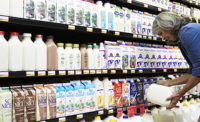Study: "CPG execs cautious on growth"
Senior financial executives of global food and beverage companies expect to achieve improved financial performance in 2011, but foresee difficulty in sustaining profit margins and increasing market share, according to a survey by KPMG International.
The New York, N.Y.-based firm said that -- in a survey of 138 food and beverage executives -- 20 percent expect "significant increases" in financial performance this year versus last, and 58 percent are expecting "some increase." Only 11 percent expect a decline in performance.
"This optimistic view is a result of a noteworthy increase in consumer demand. In fact, 30 percent said they've already seen a sustained increase in demand for their company's products and services since the economic slowdown, with 44 percent expecting the increase in 2011, and 20 percent in 2012 or later," the firm said.
In sharp contrast with the optimism expressed about their companies' financial performance in 2011 and the recovering economy, 49 percent surveyed by KPMG indicate that they will have difficulty sustaining profit margins. In addition, 45 percent say they will have difficulty increasing market share.
"These senior financial executives are expressing cautious optimism, but we remain in a state of flux," said Willy Kruh, global chair of KPMG's Consumer Markets practice. "We're still experiencing an erosion of spending as people are simply spending less, so the focus on cost management going forward is still critical."
In reviewing the responses from the U.S. execs in the survey, Patrick Dolan, KPMG LLP national line of business leader – Consumer Markets, and U.S. sector leader – Food, Drink and Consumer Goods, said the execs "are projecting more tepid growth in financial performance this year but they are more optimistic about increasing market share."
Dolan also points out that U.S. execs indicated that they are more likely to pursue growth organically than through mergers and acquisitions. "U.S. finance execs don't feel an enormous lift from the recovery and have their work cut out in building a growth platform and taking their businesses forward. To remain competitive, they intend to focus on their core markets and look to Asia and Latin America for growth," Dolan said.
The KPMG survey found that the methods for entering new geographic markets will vary. Thirty-nine percent of the food and beverage executives responding globally intend to do so by adding additional distribution channels, including on-line, 37 percent through mergers and acquisitions, and 29 percent plan to open new stores. In pursuing domestic growth, 57 percent will do so primarily through organic growth, 22 percent through organic and M&A, and 16 percent through M&A.
While the economic downturn has had a significant impact on profits and growth over the past three years, company execs feel that their firms have been strengthened in many ways. For example, 48 percent of global consumer finance execs said their cost structures have improved, compared to 14 percent who say that they are in a worse position, and 43 percent express that they are in a better position today with suppliers compared to eight percent saying worse.
To improve supply chain efficiency and costs over the next two years, the food and beverage execs see investing in production or distribution technology, enhancing distribution structure, decreasing inventory levels, and consolidating suppliers as the greatest priorities.
KPMG's Kruh said he feels that companies, to generate growth and success in the years ahead, will "need to reconsider and often recast their understanding of customers, markets, and their means of serving them. A key to success will be for companies to harness the vast amounts of data that resides in a company that can derive the insights that lead to new markets, new strategies and new operating models that will ultimately generate growth and profitability," he said.
KPMG conducted its survey in the first quarter of this year and conducted another phase in April to gauge how crisis in the Middle East and Japan in April may have impacted operations. Sixty-four percent reported little or no impact on their business operations, while 31 percent reported moderate impact, with five percent seeing a dramatic impact. When presented with an array of issues, 61 percent said they expect "energy, input, and merchandise prices" will be most affected, followed by 35 percent who said "availability of goods and services from my company's suppliers."
KPMG is a global network of professional firms providing audit, tax and advisory services.
The New York, N.Y.-based firm said that -- in a survey of 138 food and beverage executives -- 20 percent expect "significant increases" in financial performance this year versus last, and 58 percent are expecting "some increase." Only 11 percent expect a decline in performance.
"This optimistic view is a result of a noteworthy increase in consumer demand. In fact, 30 percent said they've already seen a sustained increase in demand for their company's products and services since the economic slowdown, with 44 percent expecting the increase in 2011, and 20 percent in 2012 or later," the firm said.
In sharp contrast with the optimism expressed about their companies' financial performance in 2011 and the recovering economy, 49 percent surveyed by KPMG indicate that they will have difficulty sustaining profit margins. In addition, 45 percent say they will have difficulty increasing market share.
"These senior financial executives are expressing cautious optimism, but we remain in a state of flux," said Willy Kruh, global chair of KPMG's Consumer Markets practice. "We're still experiencing an erosion of spending as people are simply spending less, so the focus on cost management going forward is still critical."
In reviewing the responses from the U.S. execs in the survey, Patrick Dolan, KPMG LLP national line of business leader – Consumer Markets, and U.S. sector leader – Food, Drink and Consumer Goods, said the execs "are projecting more tepid growth in financial performance this year but they are more optimistic about increasing market share."
Dolan also points out that U.S. execs indicated that they are more likely to pursue growth organically than through mergers and acquisitions. "U.S. finance execs don't feel an enormous lift from the recovery and have their work cut out in building a growth platform and taking their businesses forward. To remain competitive, they intend to focus on their core markets and look to Asia and Latin America for growth," Dolan said.
The KPMG survey found that the methods for entering new geographic markets will vary. Thirty-nine percent of the food and beverage executives responding globally intend to do so by adding additional distribution channels, including on-line, 37 percent through mergers and acquisitions, and 29 percent plan to open new stores. In pursuing domestic growth, 57 percent will do so primarily through organic growth, 22 percent through organic and M&A, and 16 percent through M&A.
While the economic downturn has had a significant impact on profits and growth over the past three years, company execs feel that their firms have been strengthened in many ways. For example, 48 percent of global consumer finance execs said their cost structures have improved, compared to 14 percent who say that they are in a worse position, and 43 percent express that they are in a better position today with suppliers compared to eight percent saying worse.
To improve supply chain efficiency and costs over the next two years, the food and beverage execs see investing in production or distribution technology, enhancing distribution structure, decreasing inventory levels, and consolidating suppliers as the greatest priorities.
KPMG's Kruh said he feels that companies, to generate growth and success in the years ahead, will "need to reconsider and often recast their understanding of customers, markets, and their means of serving them. A key to success will be for companies to harness the vast amounts of data that resides in a company that can derive the insights that lead to new markets, new strategies and new operating models that will ultimately generate growth and profitability," he said.
KPMG conducted its survey in the first quarter of this year and conducted another phase in April to gauge how crisis in the Middle East and Japan in April may have impacted operations. Sixty-four percent reported little or no impact on their business operations, while 31 percent reported moderate impact, with five percent seeing a dramatic impact. When presented with an array of issues, 61 percent said they expect "energy, input, and merchandise prices" will be most affected, followed by 35 percent who said "availability of goods and services from my company's suppliers."
KPMG is a global network of professional firms providing audit, tax and advisory services.
Looking for a reprint of this article?
From high-res PDFs to custom plaques, order your copy today!





